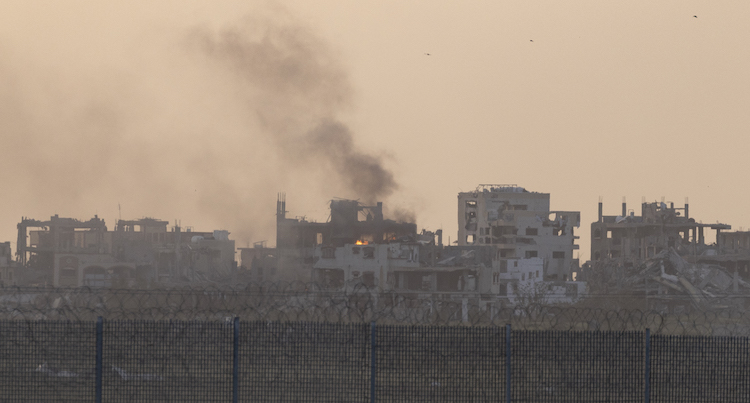The New Yorker has a fascinating essay on the relevance of Israel’s war against Hamas to U.S. military planners who have the unfortunate task of preparing for a possible hot war with China. Seen through the eyes of a former judge advocate general—a U.S. military figure who knows the realities of war and the laws that govern it, amounting to a unique level of expertise—Israel’s counteroffensive in Gaza looks very different from the picture painted by NGOs and the media.
“At the Rafah border, I.D.F. intelligence officers showed [former U.S. JAG Geoffrey] Corn surveillance videos that he says demonstrated Hamas activity in the area before the I.D.F. offensive commenced,” Colin Jones writes. “The suggestion was that the destruction he saw was not the product of an indiscriminate assault and that the laws of war had been upheld. Hamas’s use of civilian buildings transformed those sites into ‘military objectives,’ Corn said. The civilians killed were not targets but ‘incidental deaths.’”
Corn and Jones go on to discuss the fact that the level of physical damage doesn’t tell you whether war crimes were committed. This is both important and self-evident. To wit: If one house in Gaza City were reduced to rubble, no one would assume that meant the law had been broken; anyone would say “tell me what happened there” before reaching a conclusion. If Hamas had been operating from that house, it would explain the destruction.
Now what if Hamas was operating from 10 houses in that Gaza City neighborhood? Does any one of those 10 houses become untouchable simply because there are a lot of house with Hamas fighters?
Legal action does not become a war crime simply because that legal action happens repeatedly. Deep down, Israel’s critics simply have to know this. Thus, not only are war-crime accusations often wrong; they are delivered in bad faith.
That is the first lesson of the New Yorker story: that it is actually Israel’s critics who tend not to care about international law. They are not seeking to clearly apply international humanitarian law to the wars they observe. Israel has repeatedly found ways to defeat its enemies legally, and this frustrates them. They want Israel to restrict its engagement beyond what international law requires. The reason is that they want Israel to lose the war. That does not make it illegal for Israel to win the war.
Another example that stood out: The report that Corn co-authored stated, “We believe the I.D.F. has fulfilled its legal obligations to provide humanitarian access and assistance to Gazan civilians.” That isn’t surprising. Humanitarian law generally does not require Israel to provide what Hamas could provide to its citizens but chooses not to. The law also exempts the provision of aid when there are “serious reasons for fearing” that the aid will be diverted from its destination or that the enemy army will gain a strategic advantage through its own hoarding or withholding of the items being brought in from the outside. Obviously those often apply in the case of Israel and Hamas. The fact that Israel allowed for most of the war the equivalent of 3,000 calories per day per Gazan means Israel regularly has gone above and beyond what the law requires. This fact bothers Israel’s critics when it should give them heart.
The second lesson from the article concerns the concept of “expertise.” Corn is an actual, undeniable expert on this matter. Yet how often does the public see him quoted in reporting on the war? Even the New Yorker article falls into this trap: “Numerous experts have accused Israel of flouting the laws of war, including Francesca Albanese, the U.N. special rapporteur on the Occupied Palestinian territories, who argued that Israel had weaponized international humanitarian law.”
As I explained in detail in January, Albanese is, first and foremost, a vocal and unapologetic advocate of Hamas. The U.S. government considers her an anti-Semite—because she is an anti-Semite. But perhaps more to the point, Albanese has clearly stated that Israel does not have the right to self-defense against threats from Gaza. There is no planet on which this person can be granted the rank of “expert” on international law. In fact, she’s a great example of the aforementioned problem: Because Israel isn’t committing genocide, Albanese has to make up crimes that sound like genocide. These include “domicide” and “ecocide.”
That Albanese doesn’t believe Israel has the legal right of self-defense after Oct. 7 closes this debate: It is possible to be an expert on international law and also a rabid anti-Semite, but the entirety of Albanese’s claim to expertise is that she’s a rabid anti-Semite.
And yet the New Yorker quoted her, because that’s who the so-called “experts” are in the world of the United Nations and the NGO satellites that float around it like space garbage.
Reporters know that experts exist. But they don’t like hearing what experts have to say, so they call activists and anti-Semites instead. Expertise is one of the notable casualties of this war.


















